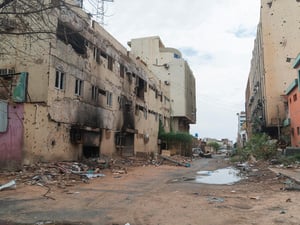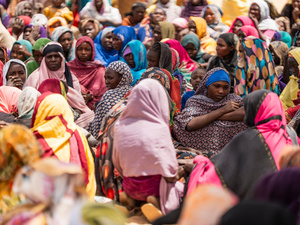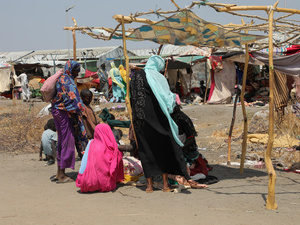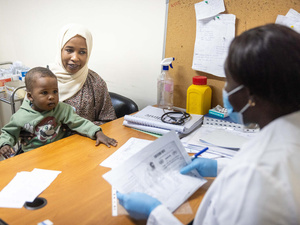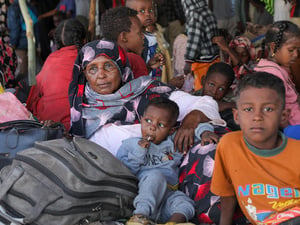UNHCR fears civilians prevented from fleeing Libya amid fighting
UNHCR fears civilians prevented from fleeing Libya amid fighting
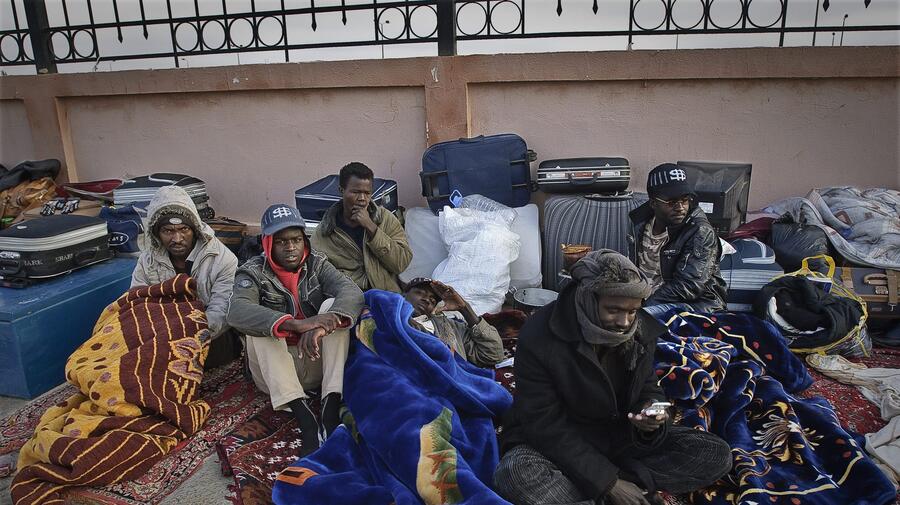
A group of Sudanese huddles against the cold at the Saloum border post in Egypt after fleeing Libya.
GENEVA, March 15 (UNHCR) - The UN refugee agency has raised renewed concerns about people possibly being prevented from leaving Libya as fighting intensifies in recent days.
While the number of people fleeing Libya continues to rise - including 2,250 arriving at the Egyptian border on Monday and a daily average of 3,000 arrivals at the Tunisian border since last Friday - the overall pace was slower than anticipated.
"Typically, we would expect to see significant numbers of injured people and women and children in a mass displacement of this nature, but so far our staff at the borders with Egypt and Tunisia have seen very few," UNHCR Spokeswoman Melissa Fleming told journalists at a press briefing in Geneva on Tuesday.
"Our hotlines continue to receive calls for help from refugees and asylum-seekers trapped in Libya. We are hearing of Eritrean refugees being detained in both eastern and western parts of the country," she added, urging all parties to ensure safe passage for all civilians fleeing violence.
Among those who managed to reach the Egyptian border at Saloum on Monday, were over 1,000 Libyans, including whole families from the eastern Libyan town of Ajdabiyya. Many said they feared the fighting would eventually block routes out of Libya.
Most of Monday's arrivals left the Egyptian border after having their papers processed. However, there are still some 3,500 people stranded there, struggling to cope with low night-time temperatures and inadequate shelter. UNHCR and partners have been distributing blankets, sleeping mats, food and water.
The majority of those stranded are Bangladeshis, but 879 left on Monday as flights from Egypt to Bangladesh increased in number.
Also stranded at Saloum are 141 persons of concern to UNHCR, including Somalis, Eritreans, Ethiopians, Darfurians, Ivorians and Palestinians. Specifically, there is a group of 80 Eritreans who crossed the border Monday night after managing to flee Benghazi. An earlier group of 35 Somalis, 5 Eritreans and 3 Ethiopians who were also trapped in Benghazi but were evacuated by boat to Alexandria and then transferred to Saloum on 10 March are still at the border.
UNHCR is undertaking refugee status determination for these people of concern. The agency has also asked the Egyptian government to allow refugees and asylum seekers to enter the country and be housed away from the border until a solution can be found for them.
In Tunisia over 16,000 people at the border camp are awaiting onwards transportation or other solutions. Since last Friday, daily arrivals have averaged some 3,000 people. Many of them have told UNHCR staff that they spent many days at Tripoli airport before coming to Tunisia.
In the meantime, the joint IOM-UNHCR humanitarian evacuation operation that started on March 1 is picking up speed. To date, 25 UNHCR flights from Tunisia and Egypt have flown more than 6,000 people home to Egypt, Bangladesh and Mali. Starting Tuesday, a further 15 flights will bring some 3,000 sub-Saharan Africans to Mali, Ghana, Chad and Niger.
A further 75 UNHCR flights are planned, carrying some 15,000 people to sub-Saharan African destinations over the next week. This was made possible when UNHCR chief António Guterres released an additional US$5 million from the agency's operational reserve on Monday.
To date 280,614 people have fled the violence in Libya. This includes over 151,324 to Tunisia, 117,991 to Egypt, 2,205 to Niger and 9,094 to Algeria.


